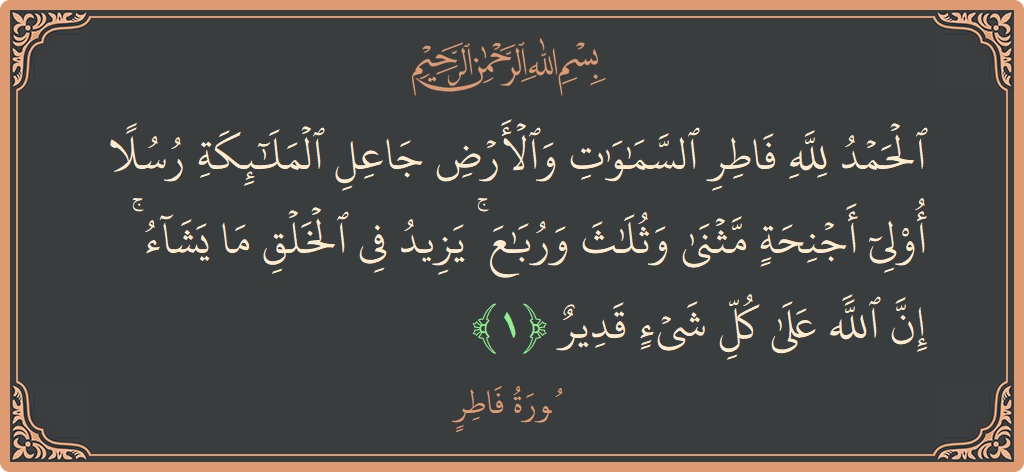Surah Faatir: Verse 1 - الحمد لله فاطر السماوات والأرض... - English
Tafsir of Verse 1, Surah Faatir
English Translation
[All] praise is [due] to Allah, Creator of the heavens and the earth, [who] made the angels messengers having wings, two or three or four. He increases in creation what He wills. Indeed, Allah is over all things competent.English Transliteration
Alhamdu lillahi fatiri alssamawati waalardi jaAAili almalaikati rusulan olee ajnihatin mathna wathulatha warubaAAa yazeedu fee alkhalqi ma yashao inna Allaha AAala kulli shayin qadeerunTafsir of Verse 1
Commentary
As for the statement: جَاعِلِ الْمَلَائِكَةِ رُسُلًا (who makes the angels messengers), it means that angels were assigned to convey the messages and injunctions of Allah Ta’ ala. From this, it is obvious that they are sent to the noble prophets (علیہم السلام) as the message-bearers or envoys of Allah. They convey the revelations and the injunctions of Allah to them. And it is also possible that the word: رسول (Rasul) used here may be denoting the sense of link at this place, that is, they become a link between Allah Ta’ ala and His universal creation out of which the noble prophets (علیہم السلام) are the superior-most. Thus, they also become an intermediary link for the transmittal of revelation from Allah Ta ala to them. Then, these very angels happen to be the means of bringing the mercy of Allah or His punishment to the universal creation.
The next statement: أُولِي أَجْنِحَةٍ مَّثْنَىٰ وَثُلَاثَ وَرُبَاعَ (having wings, in twos and threes and fours) means that Allah Ta’ ala has given to the angels feathered wings they can fly with. The wise consideration behind it is obvious as they traverse the distance between the heavens and the earth repeatedly, and this can become possible only when they are endowed with the necessary speed to so traverse, something that can come about in the mode of flying only:
And the words: مَّثْنَىٰ وَثُلَاثَ وَرُبَاعَ (in twos and threes and fours) are, evidently enough, numerical adjectives referring to: أَجْنِحَةٍ (wings) in the sense that the number of the feathers angels have varies from angel to angel . Some have only two wings. Others have three. Still others have four. Even the numbers mentioned here are not comprehensive, rather they are mentioned here just as an example, because it is proved by a Hadith in Sahih of Muslim that Sayyidna Jibra'il (علیہ السلام) has six hundred feathers. (Qurtubi, Ibn Kathir)
Moreover, it is also possible that these three words are numerical adjectives referring to the word: رُسُلًا ، (rusulan: bearers of the message) in the sense that these angels who deliver messages from Allah Ta’ ala to this world sometimes come in twos and at others in threes or fours. Once again, in this situation too, the number of four is not intended for restriction. It is there just for example because the coming of angels in a much larger number stands proved from the Qur'an itself. (Abu Hayyan in al-Bahr ul-Muhit)
The next sentence: يَزِيدُ فِي الْخَلْقِ مَا يَشَاءُ (He adds to the creation what He wills) means that Allah Ta’ ala has the power to increase whatever He wills and as much as He wills in the creation of everything He has originated. This obviously is related to: أَجْنِحَةٍ (ajnihah: wings) in that the feathers and wings of the angels are not something simply restricted to two or four in numbers, for they could be many more than these if Allah Ta’ ala so wills. Most commentators say exactly this. And Tafsir authorities Zuhri, Qatadah and others have said that this increase in creation is to be taken in its general sense which includes increase in the feathers and wings of angels as well as the increase of particular attributes in the creation of different human beings which, then, includes the beauty of form, the beauty of character, the beauty of voice and many more increased assets like these. Abu Hayyan has, in al-Bahr ul-Muhit, followed this track of explanation and said that things like good manners, beauty of figure and face, perfection of reason and intellect, politeness in discourse and similar others are all included therein. This second Tafsir proves that the beauty or perfection of anything one has is invariably a gift and blessing from Allah Ta’ ala for which one should be grateful to Him.
Which was revealed in Makkah
In the Name of Allah, the Most Gracious, the Most Merciful.
The Power of Allah
Ibn `Abbas, may Allah be pleased with him, said, "I did not know what Fatir As-Samawati wal-Ard meant until two bedouins came to me disputing over a well. One of them said to his companion, `Ana Fatartuha,' meaning, `I started it."' Ibn `Abbas, may Allah be pleased with him, also said,
(Fatir of the heavens and the earth,) means, "The Originator of the heavens and the earth." Ad-Dahhak said, "Every time the phrase Fatir As-Samawati wal-Ard is used in the Qur'an, it means the Creator of the heavens and the earth."
(Who made the angels messengers) means, between Him and His Prophets.
with wings means, with which they fly to convey quickly that which they have been commanded to convey.
two or three or four. means, among them are some who have two wings, some have three and some who have four. Some have more than that, as stated in the Hadith mentioning that the Messenger of Allah saw Jibril (peace be upon him) on the Night of the Isra’ with six hundred wings. Between each pair of wings was a distance like that between the east and the west. Allah says:
(He increases in creation what He wills. Verily, Allah is Able to do all things.) As-Suddi said, "He increases their wings and creates them as He wills."
